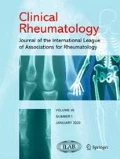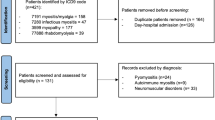Abstract
Hereditary periodic fever syndromes (HPFS) are rare genetic diseases characterized by recurrent episodes of inflammation. Little information is available concerning HPFS in Latin American Hispanic population. The purpose of this study was to determine the clinical and genetic features of HPFS in Chilean population. A multicenter retrospective study of Hispanic Chilean patients with genetically confirmed HPFS was performed. We included 13 patients, 8 with familial Mediterranean fever (FMF) and 5 with TNF receptor-associated periodic syndrome (TRAPS), evaluated at rheumatology or pediatric rheumatology clinics between January 2007 and December 2010. Median age of symptoms onset was 8 years (range 1–35) and 8 years (range 0.3–21) for FMF and TRAPS, respectively. Median duration of fever was 3 days (range 2.5–15) for FMF and 21 days (range 9.5–30) for TRAPS. Genotyping of the MEFV gene in FMF patients revealed a homozygous M694V missense mutation in one patient, and heterozygous missense mutations in seven patients: M694V (n = 3), E148Q, R717H, A744S, and A511V. Sequencing of the TNFRSF1A gene in TRAPS patients revealed heterozygous missense mutations in four patients: T50M, C30R, R92Q, and IVS3+30:G→A, and a two-base pair deletion (IVS2-17_18del2bpCT) in one patient. Mutation in MEFV R717H and mutations in TNFRSF1A IVS2-17_18del2bpCT and IVS3+30:G→A are novel and have not been described previously. This study reports the largest series of genetically confirmed HPFS in Latin America, and adds evidence regarding the clinical and genetic characteristics of patients with FMF and TRAPS in Hispanic population. Mutations identified in MEFV and TNFRSF1A genes include defects reported in other ethnicities and novel mutations.
Similar content being viewed by others
References
Kastner DL (2005) Hereditary periodic fever syndromes. Hematology Am Soc Hematol Educ Program 74–81
Kastner DL, Aksentijevich I, Goldbach-Mansky R (2010) Autoinflammatory disease reloaded: a clinical perspective. Cell 140:784–790
Hoffman HM (2009) Therapy of autoinflammatory syndromes. J Allergy Clin Immunol 124:1129–1138, quiz 1139-1140
Masters SL, Simon A, Aksentijevich I, Kastner DL (2009) Horror autoinflammaticus: the molecular pathophysiology of autoinflammatory disease (*). Annu Rev Immunol 27:621–668
Ben-Chetrit E, Touitou I (2009) Familial mediterranean Fever in the world. Arthritis Rheum 61:1447–1453
Ozen S (2004) Renal amyloidosis in familial Mediterranean fever. Kidney Int 65:1118–1127
Chae JJ, Cho YH, Lee GS, Cheng J, Liu PP, Feigenbaum L, Katz SI, Kastner DL (2011) Gain-of-function Pyrin mutations induce NLRP3 protein-independent interleukin-1beta activation and severe autoinflammation in mice. Immunity 34:755–768
Booty MG, Chae JJ, Masters SL, Remmers EF, Barham B, Le JM, Barron KS, Holland SM, Kastner DL, Aksentijevich I (2009) Familial Mediterranean fever with a single MEFV mutation: where is the second hit? Arthritis Rheum 60:1851–1861
Simon A, Park H, Maddipati R, Lobito AA, Bulua AC, Jackson AJ, Chae JJ, Ettinger R, de Koning HD, Cruz AC, Kastner DL, Komarow H, Siegel RM (2010) Concerted action of wild-type and mutant TNF receptors enhances inflammation in TNF receptor 1-associated periodic fever syndrome. Proc Natl Acad Sci U S A 107:9801–9806
Williamson LM, Hull D, Mehta R, Reeves WG, Robinson BH, Toghill PJ (1982) Familial Hibernian fever. Q J Med 51:469–480
Stojanov S, McDermott MF (2005) The tumour necrosis factor receptor-associated periodic syndrome: current concepts. Expert Rev Mol Med 7:1–18
Espinosa G, Arostegui JI, Plaza S, Rius J, Cervera R, Yague J, Font J (2005) Behcet's disease and hereditary periodic fever syndromes: casual association or causal relationship? Clin Exp Rheumatol 23:S64–S66
Alvarez-Lobos M, Hunter B, Cofre C, Benitez C, Talesnik E, Oyarzo M, Arostegui JI, Yague J (2006) Tumor necrosis factor receptor associated periodic syndrome (TRAPS). Report of two cases. Rev Med Chil 134:1558–1561
Infevers database: The registry of hereditary auto-inflammatory disorders mutations. http://fmf.igh.cnrs.fr/ISSAID/infevers/. Accessed 15 April 2011
Matos TC, Terreri MT, Petry DG, Barbosa CM, Len CA, Hilario MO (2009) Autoinflammatory syndromes: report on three cases. Sao Paulo Med J 127:314–316
Radisic M, Santamarina J, Froment R (2006) Sustained, progressive, nonresolving abdominal pain: a previously undescribed clinical presentation of familial Mediterranean fever. Clin Rheumatol 25:914–916
Halabe-Cherem J, Perez-Jimenez C, Nellen-Hummel H, Mercado-Atri M, Sigala-Rodriguez C, Castanon-Gonzalez J (2004) Familial Mediterranean fever in Mexico City. A 20-year follow-up. Cir Cir 72:135–138
Tunca M, Akar S, Onen F, Ozdogan H, Kasapcopur O, Yalcinkaya F, Tutar E, Ozen S, Topaloglu R, Yilmaz E, Arici M, Bakkaloglu A, Besbas N, Akpolat T, Dinc A, Erken E (2005) Familial Mediterranean fever (FMF) in Turkey: results of a nationwide multicenter study. Medicine (Baltimore) 84:1–11
Samuels J, Aksentijevich I, Torosyan Y, Centola M, Deng Z, Sood R, Kastner DL (1998) Familial Mediterranean fever at the millennium. Clinical spectrum, ancient mutations, and a survey of 100 American referrals to the National Institutes of Health. Medicine (Baltimore) 77:268–297
Schwabe AD, Peters RS (1974) Familial Mediterranean Fever in Armenians. Analysis of 100 cases. Medicine (Baltimore) 53:453–462
Dode C, Andre M, Bienvenu T, Hausfater P, Pecheux C, Bienvenu J, Lecron JC, Reinert P, Cattan D, Piette JC, Szajnert MF, Delpech M, Grateau G (2002) The enlarging clinical, genetic, and population spectrum of tumor necrosis factor receptor-associated periodic syndrome. Arthritis Rheum 46:2181–2188
Moradian MM, Sarkisian T, Ajrapetyan H, Avanesian N (2010) Genotype-phenotype studies in a large cohort of Armenian patients with familial Mediterranean fever suggest clinical disease with heterozygous MEFV mutations. J Hum Genet 55:389–393
Marek-Yagel D, Berkun Y, Padeh S, Abu A, Reznik-Wolf H, Livneh A, Pras M, Pras E (2009) Clinical disease among patients heterozygous for familial Mediterranean fever. Arthritis Rheum 60:1862–1866
Ben-Chetrit E, Levy M (1998) Familial Mediterranean fever. Lancet 351:659–664
Agar L, Saffie N (2005) Chilenos de origen árabe: Las fuerzas de las raíces. Revista Miscelanea de Estudios Arabes y Hebraicos, Sección Arabe-Islam 54:3–27
Sari S, Egritas O, Bukulmez A, Dalgic B, Soylemezoglu O (2009) Is familial Mediterranean fever a possible cofactor for Budd–Chiari syndrome? J Pediatr Gastroenterol Nutr 49:481–484
Hoekstra J, Leebeek FW, Plessier A, Raffa S, Darwish Murad S, Heller J, Hadengue A, Chagneau C, Elias E, Primignani M, Garcia-Pagan JC, Valla DC, Janssen HL (2009) Paroxysmal nocturnal hemoglobinuria in Budd–Chiari syndrome: findings from a cohort study. J Hepatol 51:696–706
Arostegui JI, Yague J (2007) Hereditary systemic autoinflammatory diseases. Hereditary periodic fever syndromes. Med Clin (Barc) 129:267–277
Aksentijevich I, Galon J, Soares M, Mansfield E, Hull K, Oh HH, Goldbach-Mansky R, Dean J, Athreya B, Reginato AJ, Henrickson M, Pons-Estel B, O'Shea JJ, Kastner DL (2001) The tumor-necrosis-factor receptor-associated periodic syndrome: new mutations in TNFRSF1A, ancestral origins, genotype-phenotype studies, and evidence for further genetic heterogeneity of periodic fevers. Am J Hum Genet 69:301–314
Marek-Yagel D, Berkun Y, Padeh S, Lidar M, Shinar Y, Bar-Joseph I, Reznik-Wolf H, Langevitz P, Livneh A, Pras E (2010) Role of the R92Q TNFRSF1A mutation in patients with familial Mediterranean fever. Arthritis Care Res (Hoboken) 62:1294–1298
Drewe E, McDermott EM, Powell PT, Isaacs JD, Powell RJ (2003) Prospective study of anti-tumour necrosis factor receptor superfamily 1B fusion protein, and case study of anti-tumour necrosis factor receptor superfamily 1A fusion protein, in tumour necrosis factor receptor associated periodic syndrome (TRAPS): clinical and laboratory findings in a series of seven patients. Rheumatology (Oxford) 42:235–239
Holle JU, Capraru D, Csernok E, Gross WL, Lamprecht P (2006) Expansion of CD28-CD27-NKG2D+ effector memory T cells and predominant Th1-type response during febrile attacks in tumor necrosis factor-associated periodic syndrome. Isr Med Assoc J 8:142–144
Ida H, Aramaki T, Arima K, Origuchi T, Kawakami A, Eguchi K (2006) Successful treatment using tacrolimus (FK506) in a patient with TNF receptor-associated periodic syndrome (TRAPS) complicated by monocytic fasciitis. Rheumatology (Oxford) 45:1171–1173
Disclosures
None.
Grant support
Dr Alvarez-Lobos is supported by FONDECYT Grant 1100971. Dr Arostegui and Dr. Yague are supported by FIS PS09/01182 Grant.
Author information
Authors and Affiliations
Corresponding author
Rights and permissions
About this article
Cite this article
Vergara, C., Borzutzky, A., Gutierrez, M.A. et al. Clinical and genetic features of hereditary periodic fever syndromes in Hispanic patients: the Chilean experience. Clin Rheumatol 31, 829–834 (2012). https://doi.org/10.1007/s10067-012-1942-3
Received:
Revised:
Accepted:
Published:
Issue Date:
DOI: https://doi.org/10.1007/s10067-012-1942-3




